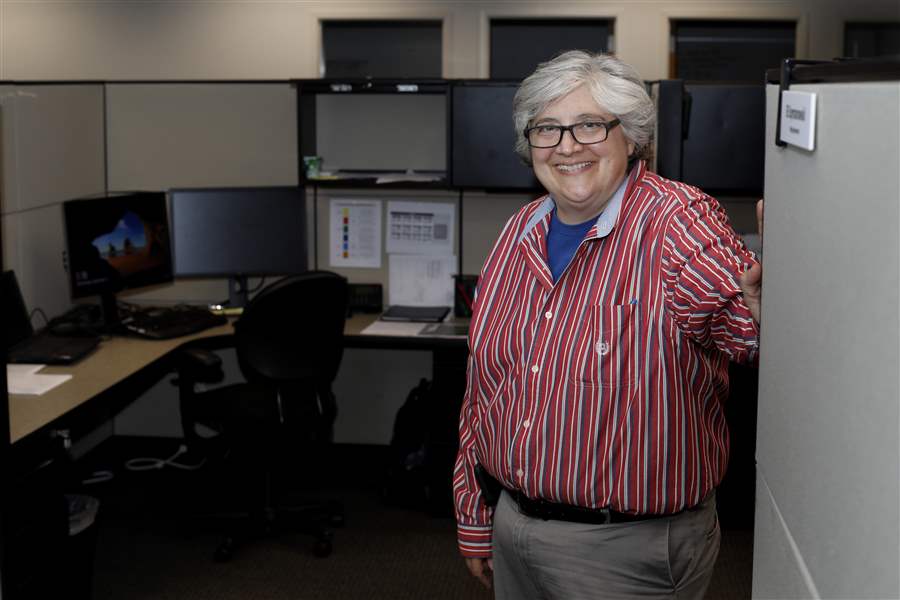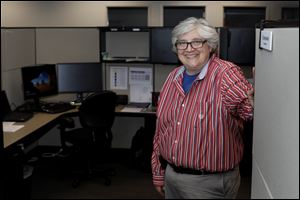
Engineer’s career has right chemistry
9/8/2018
Marianne Corrao is Executive Vice President and Founding Partner of Nexus Engineering.
THE BLADE/KATIE RAUSCH
Buy This Image
More women are working as engineers today than in the late 1980s when Marianne Corrao graduated from college with a degree in chemical engineering, but still more, she said, are needed in the field.
Ms. Corrao, executive vice president and co-founder of Nexus Engineering Group LLC., started her firm with her business partner, Jeff Herzog, in 2005. The business has offices in Maumee, Cleveland, and Houston. For almost 20 years before Nexus, she had jobs with BP — then Standard Oil Company — and Praxair, a gas company based in Connecticut.

Marianne Corrao is Executive Vice President and Founding Partner of Nexus Engineering.
As a resident of both Perrysburg and Cleveland, Ms. Corrao often works out of the firm’s Maumee office. Even when she was younger, she said, she put pressure on herself to succeed because simply being a woman in a male-dominated field made her feel like a kind of ambassador. A mentor. A role model.
“I’ve had an incredibly positive experience,” she said. “I was never made to feel like I was out of place.”
In the working world as a whole, she said she believes there is still some difficulty in allowing women to balance their careers and personal lives. Studies show a number of female engineers left the field after eight or 10 years and never returned.
According to a 2012 study done by researchers at the University of Wisconsin-Milwaukee, 20 percent of women who leave engineering do so because they didn’t like the workplace climate, their boss, or the culture. Eight percent left to spend more time with their family.
Of those women who graduated with an engineering degree who never entered the field, one-third said they did so because “of their perceptions of engineering as being inflexible or the engineering workplace culture as being non-supportive of women,” according to the study.
Women make up half the population on Earth, Ms. Corrao said. Having their perspective adds value not just in engineering or STEM fields, but in every subject, including history and politics.
“We really only know half of human history, in my opinion,” she said. “What did we miss?”
Ms. Corrao grew up in Brooklyn Heights, a small village just outside Cleveland. In high school, every female student was required to take home economics, and every male student was required to take shop class. If a girl wanted to take shop, she could, after she fulfilled her home economics requirement. The opposite was true for the boys. But students crossed over.
Many of her teachers, though, never wavered in their support once she developed an affinity — and ability — for math and science. Educators must continue to nurture and encourage inquiring minds of the next generation, she said. They need to be willing to say, “if you like this, go for it.”
Ms. Corrao didn’t know she wanted to be a chemical engineer until she went to college at Cleveland State University and did a co-op with Standard Oil Co.
Before that experience, she had plans to become a chemist, because she loved the subject and was good at math.
Those subjects had always appealed to her, she said, because they weren’t subjective. There was a problem, and there was a right answer.
“What I liked about it was, it was so definitive,” she said.
The co-op, though, changed the trajectory of her life.
“I had no idea what a chemical engineer did,” she said.
She was able to do small projects, she saw and took part in practical applications to solving problems. And after she graduated, she took a job with Standard Oil Co. at the Lima Refinery and worked there for eight years. Then, Ms. Corrao took a job with an engineering firm.
“I loved project work, and I wanted to do more project work,” she said.
At that firm, she began working again with Mr. Herzog, whom she first met during her co-op and had kept in touch with throughout their careers. While they were working together for Praxair in Houston, colleagues at BP — formerly Standard Oil — contacted her to say they needed some engineers for some upcoming projects. Would they be interested?
Instead of taking the jobs, Ms. Corrao and Mr. Herzog struck out on their own and opened their own firm.
“It was exciting,” she said. “A little nerve-racking, I’d say.”
It was an industry they were familiar with, though, and they were able to contract their services to BP, which had wanted to hire them in the first place. So, when they began, they at least had their first client.
“We knew we could do a good job,” she said.
Since then, Nexus has grown from consisting of just Ms. Corrao and Mr. Herzog to three offices in two states and 115 employees. The private firm offers engineering services to other companies in their projects, she said. Sometimes, all companies need is expertise and advice, rather than designs.
Sometimes, that means advising that a project would be a bad idea.
“We’re proud that we help our customers make good business decisions,” she said.
Ms. Corrao wants Nexus to be an enjoyable place to work. She tries to be flexible with employees’ schedules, because she knows sometimes other obligations can pop up.
This past summer, the company offered a co-op to students from the University of Toledo, Cleveland State University, and Case Western Reserve University.
It was the first year for such a program, and it went well, she said. Three of the four students who participated in the co-op accepted offers to work part-time for the company.
To young people, she advised that hard work can pay off if they’re willing to do it.
“If you think anything is going to be handed to you, that’s not the way it works,” she said.
Don’t let new technology pass you by, Ms. Carrao said. Be willing to learn. Be good at what you do, and enjoy it.
“If you’re miserable at what you do, find something else to do because life is too short,” she said.
Contact Kate Snyder at ksnyder@theblade.com, 419-724-6282 or on Twitter @KL_Snyder